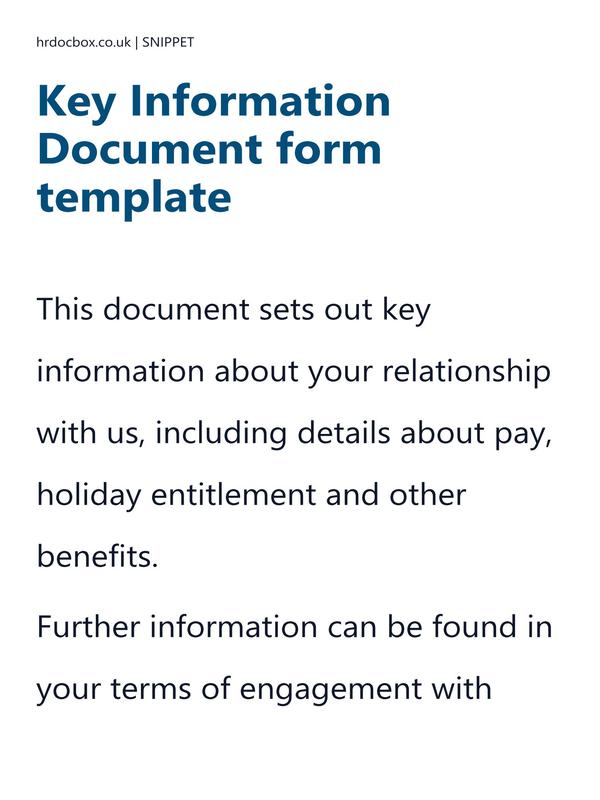Key Information Document form template


Key Information Document template for agency workers outlining pay, rights and assignment details.
Our Key Information Document for Agency Workers outlines crucial details about assignments, rights, and responsibilities, ensuring clarity and transparency in temporary work arrangements.
- Includes 12 months' access to the Key Information Document form template, with all updates provided free of charge and notified to you.
- UK-specific accuracy.
- 446 words over 2 pages.
- Last updated 24/01/2026.
- Format: Word / XLS / plain text / email.
- Delivery: Instant download after purchase (no physical item).
- Access: Download link shown here after checkout.
- This Key Information Document form template will SAVE you up to 1 hour 30 mins drafting & research, save you money, and reduce your risk.
Key Information Document
This document sets out key information about your relationship with us, including details about pay, holiday entitlement and other benefits.
Further information can be found in your terms of engagement with [company name].
The Employment Agency Standards (EAS) Inspectorate is the government authority responsible for the enforcement of certain agency worker rights. You can raise a concern with them directly on 020 7215 5000 or through the Acas helpline on 0300 123 1100, Monday to Friday, 8am to 6pm.
GENERAL INFORMATION
| Your name: | |
| Name of employment business: | [Your company name] |
| Your employer (if different from the employment business): | [Assigned company] |
| Type of contract you will be engaged under: | [i.e. You will not be employed by, but will be engaged |
This is a 30% preview of the Key Information Document form template. For instant full access, purchase this item or a parent bundle.
Key Information Document form template purpose
Key information documents are intended to give agency workers a number of pay related facts, along with some other details about their engagement, prior to agreeing terms with an employment business.
This is so they have more information about their pay at an earlier stage, particularly so that they can see how deductions and fees affect their pay through the supply chain.
Practical application of a Key Information Document form template
- The Key Information Document form template should be actioned / delivered from 6 april 2020, employment businesses must give all new agency workers a key information document before agreeing contractual terms. in practice, this means a key information document will need to be one of the first things an employment business gives agency workers..
- It is sent / delivered by a Company / HR team to a candidate.
Compliance
Compliance
This Key Information Document form template incorporates relevant UK laws and HR standards, including those listed below:
-
Key information documents for agency workers must outline minimum expected earnings, including statutory deductions like income tax, and describe all pay deductions, either by stating amounts or explaining calculations.
-
Representative examples in key facts pages must illustrate how deductions affect take-home pay using real numbers, even if estimates, reflecting various payment methods.
-
Employment businesses should offer standard key facts pages for different payment methods and may show workers these options to help them understand deductions, though it's not mandatory. Each worker must receive a document relevant to their payment method.
-
Updates to key information documents are necessary only when changes occur, such as new deductions or rights under employment regulations, rather than for every assignment.
Key Information Document workflow
Key Information Document workflow
Check which resources should be implemeted before and/or after the Key Information Document form template, to understand the workflow.
Work Finding Agreement
Our Work Finding Agreement Template formalises the arrangement between agencies and job seekers, outlining terms, expectations, and responsibilities for successful placements.
Frequently Asked Questions about a Key Information Document form template
Frequently Asked Questions about a Key Information Document form template
-
Can I use the Key Information Document form template in my small business?
Yes. The Key Information Document form template is designed to be flexible and suitable for organisations of all sizes, including small businesses and charities. It follows UK employment law best practice, so even if you don't have an in-house HR team, you can confidently apply it.
-
Is the Key Information Document form template compliant with 2026 UK employment law?
Absolutely. Like the Key Information Document form template, all of our templates are drafted with the latest ACAS guidance and UK employment legislation in mind. We review and update them regularly, so you can be confident they remain compliant.
-
Can I customise the Key Information Document form template for my organisation?
Yes, we highlight the areas of the Key Information Document form template that you need to update with your own details, and where you need to make decisions to suit your situation. This saves you time and ensures that you meet best practice.
-
Do I get instant access to the Key Information Document form template?
Yes. Once purchased, you'll be able to download the Key Information Document form template instantly. Templates are provided in editable Word or Excel format so you can customise them easily, and in PDF format for easy sharing.
-
What if I need more help, not just a Key Information Document form template?
If you're looking for broader support, we also offer toolkits and library bundles that include the Key Information Document form template, along with other HR templates and policies for fully managing your situation. These may be more cost-effective if you need deeper advice.
-
Why should I use this Key Information Document form template, and not AI to generate it?
The risk of using a free AI-generated template 'without review' includes your legal exposure, missing context, and no awareness of the wider process, whereas purchasing the Key Information Document form template from us mitigates that risk.
